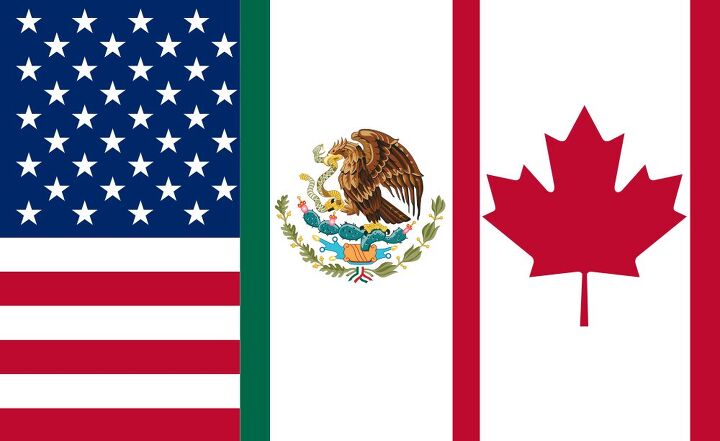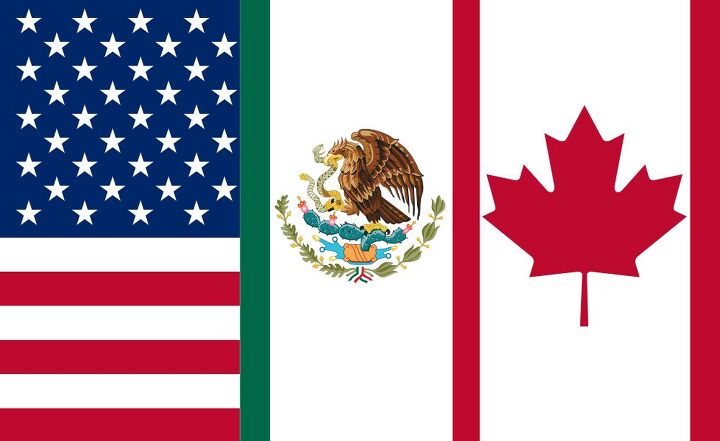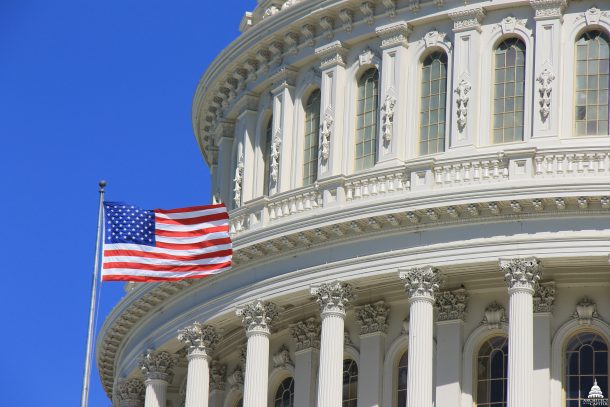#TradeNegotiations
Slow-Moving NAFTA Talks Could Be Further Hampered by Mexico's Next President
With NAFTA negotiations finally progressing a bit, now would be the perfect time for something to bring up another potential hurdle and ruffle everyone’s feathers. This time, the prospective cataclysm stems from Mexico, and has manifested itself as one man — presidential frontrunner Andres Manuel Lopez Obrador, known colloquially as “AMLO.”
Business interests and NAFTA advocates are fearful the leftist candidate could chuck a wrench into the trade policy by adopting a hardline stance opposing the White House’s plan to redefine the agreement to favor the United States. Lopez Obrador is a long-time proponent of social programs that help vulnerable members of society. However, many criticize him for being a populist with socialist ideals that do not serve the financial well-being of the country at large.
While this is debatable, winning Mexico’s July 1st election could see him push back hard against U.S. trade proposals, stalling progress.
NAFTA Talks Finally Progressing Slightly Better Than a Dumpster Fire
After what could be called some of the least productive negotiations in North American history, some progress is finally being made on the North American Free Trade Agreement. We know, with all of the negative rhetoric being slung from all sides, it sounds impossible. However, all three trading partners are beginning to bend on some of the issues that have proven the trickiest to navigate.
Among them is the faintest glimmer of hope that the automotive content requirements pushed by the United States might be adopted by the other nations, albeit in a modified form.
Still, progress is progress, and it only took about six months to get to a point where some meaningful headway could finally be made. Absolutely incredible. Let’s give these officials a huge round of applause for really getting in there, taking care of business, and not wasting a bunch of time.
Union Boss Reassures Everyone That NAFTA Is Toast
With everyone weighing in on the ultimate fate of the North American Free Trade Agreement, it almost seems as if we’re cataloging their bets to see just how right or wrong they’ll be in the negotiatory aftermath. Considering there has been such a limited amount of progress on the trade talks, there honestly isn’t much else to do.
Suggesting that NAFTA is “is going to blow up in 2018,” Jerry Dias, president of the Canadian union Unifor, has planted his flag on the side of a total breakdown of the agreement. Unifor represents 23,500 Detroit Three auto workers living north of the border, plus some 16,000 working in the supply chain.
As a union leader, Dias is prone to hyperbolic statements. However, his insight into the situation runs a little deeper than most.
NAFTA Update: Nobody Has Any Idea What's Going On
In case you haven’t kept up with the coverage on the renegotiation of the North American Free Trade Agreement, things haven’t gone well. Despite wrapping the latest round of talks in Washington on Friday, negotiators have made no clear progress on updating the trade deal. Considering a new deal is supposed to be finalized by the end of March, it’s beginning to look as if the NAFTA revamp might be doomed.
The biggest issue crippling the talks continues to be regional-content requirements for cars to qualify for NAFTA benefits. Both Mexico and Canada have described the U.S. content proposals as “unworkable.”
U.S. Is Intentionally Sabotaging NAFTA Trade Talks, Officials Claim
President Donald Trump entered into office threatening to abandon the North American Free Trade Agreement if the United States was not given a better deal immediately. But, after negotiations began, it looked as if his ultimatum would be unnecessary.
Now, U.S. officials involved in NAFTA negotiations are being accused of making proposals on issues Mexico and Canada have said they would never agree to. Are these bold negotiation tactics being used to place the U.S. in a better position for future issues, or are trade arbitrators intentionally trying to sabotage talks so Trump can make good on his promise to leave the agreement?
NAFTA Renegotiations Begin, Automakers Worried Over Rules of Origin
The first round of the North American Free Trade Agreement renegotiations begins on Wednesday. U.S. President Donald Trump, Mexican President Enrique Peña Nieto, and Canadian Prime Minister Justin Trudeau have planned to meet in Washington, D.C. on August 16th and stay through the 20th to discuss trade policy. Afterward, NAFTA debates will be led by U.S. Trade Representative Robert Lighthizer, Canadian Foreign Minister Chrystia Freeland, and Mexican Economy Minister Ildefonso Guajardo.
While this all began as a Trump campaign promise to renegotiate a better deal for the United States (or abandon the trade agreement entirely), it has evolved over the last six months into an opportunity to modernize NAFTA policies. There’s no firm deadline for the three countries to reach an agreement, but Mexico is pushing for the process to wrap up before its presidential campaign begins in earnest in February.
NAFTA Trading Partners Agree: It's Time for a Change
Mexico and Canada are finally in agreement that NAFTA could use an update, not that the Trump administration gave them much of an opportunity to refuse renegotiations. However, after taking a critical look at the two-decade old agreement, representatives from all three nations have reached the consensus that it’s time for a change.
At Wednesday’s CAR Management Briefing Seminars, Colin Bird, minister-counselor for trade and economic policy at the Canadian Embassy, and Francisco Sandoval-Saqui, a Mexican trade official for his country’s Ministry of the Economy, laid out their country’s agendas for the NAFTA trade talks slated to begin in Washington, DC on August 16th.
Both countries are eager to make cross-border trade more fluid without handing an unfair advantage over to the United States. President Trump has previously accused NAFTA of being “the worst trade deal maybe ever signed anywhere, but certainly ever signed in this country,” and immediately moved to dismantle it upon taking office. While his stance has softened over the last few months and the reins have been handed over to Robert Lighthizer, Trump has remained bullish on the issue — claiming domestic automakers are giving away U.S. jobs and income to Canada and Mexico.
U.S. Plans to Schedule Opening NAFTA Talks in Roughly 90 Days
U.S. Commerce Secretary Wilbur Ross want to begin formal talks to renegotiate the North American Free Trade Agreement with Canada and Mexico in a little over three months, adhering to the campaign pledges made by President Donald Trump last year. Ross explained to reporters that “sometime in the next couple of weeks” he will issue a notice to Congress stating the Trump administration intends to start formal NAFTA negotiations in just 90 days.
However, since he expressed his intentions in front of a gaggle of reporters, Congress is probably already aware. But it won’t be “official” until they get a piece of paper signed by the appropriate parties on the applicable letterhead — hopefully, embossed with a fierce-looking eagle surrounded by dollar signs.
Lighthizer Confirmed as U.S. Trade Representative After Waiver Approval
I hope you’re fond of domestic automobiles.
The Trump administration is setting the table to make importing cars more difficult with the U.S. Senate confirming Robert Lighthizer in an 82-14 vote as the U.S. trade representative, prepping the country for an assertive trust from the White House’s America First trade strategy.
Former UAW President Supports Trump's NAFTA Overhaul, Less Enthusiastic About the Man
The former president of the United Automobile Workers, Bob King, says he supports President Trump’s plan to reconfigure the North American Free Trade Agreement — so long as it maintains labor’s best interests. Ironically, King’s support of the president’s trade plan came as he attended an Ann Arbor rally in support of an EPA testing facility in danger of being closed due to Trump administration budget cuts.
King, who served as the union’s president from 2010 to 2014, faults the trade pact for a loss of American jobs. It’s his belief that NAFTA allowed automakers to invest in more-affordable regions — like Mexico — at the expensive of the United States’ workforce. His successor, Dennis Williams, has echoed these claims and also wishes to see NAFTA reformed.
U.S. & Euro Automakers Lobby Free-Trade Pact Negotiators to Harmonize Safety Regs
Automakers and auto enthusiasts alike aren’t fond of the differing safety standards in Europe and the United States. Having to satisfy two different standards means increased costs for car companies that want to compete on a global scale and it also means that car enthusiasts on both continents are often deprived of desirable cars on sale in the other market. But according to Automotive News, lobbyists for automakers in the U.S. and Europe are hoping to use current negotiations over a free-trade agreement to harmonize safety standards and they are using academics to make their argument.























Recent Comments